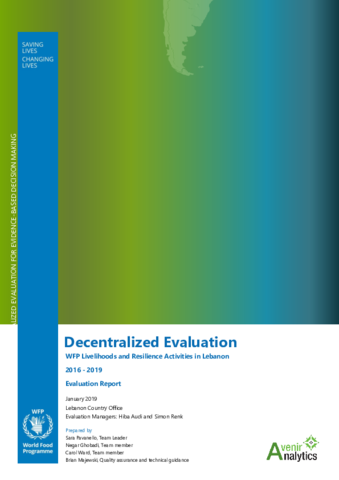
This decentralized evaluation was commissioned by the WFP Lebanon Country Office and covers WFP’s Livelihoods and Resilience Activities in Lebanon from 2016 to 2019.
The evaluation was commissioned to achieve learning and accountability objectives and to produce evidence and lessons learned from the design and implementation of the Programme in the period between August 2016 and April 2019. The evaluation was designed to assess the Programme against the following evaluation criteria: Relevance and Appropriateness, Effectiveness, Efficiency, Impact and Sustainability.
In order to respond to the evaluation questions, the Evaluation Team used a mixed-methods approach drawing on qualitative and quantitative data from primary and secondary sources. The team reviewed over 200 documents; interviewed over 70 key informants from a range of stakeholders; and conducted 28 Focus Group Discussions in sites derived from purposive sampling. aluation, clarify expectations and requirements and guide the evaluation team in its work during the various phases of the evaluation.
Key evaluation findings included:
• the objectives of the Programme are relevant and appropriate and the Programme is strongly aligned with Government strategies and priorities. However, the short-term funding mechanism, the short-term nature of activities and the limited articulation of the Theory of Change (ToC) and related livelihoods strategy are all negatively affecting the relevance and appropriateness of the Programme.
• Improve certain programmatic features including targeting, analysis and assessments, and better tailoring activities to the different needs of Syrian and Lebanese, men and women.
• The Programme has delivered its intended outputs. With regards to outcomes monitored, slight improvements in food security and coping strategy indicators for participants were found and the asset base indicator improved significantly between 2017 and 2018.
• Programme participation and cash injections for the duration of activities had positive effects on participants well-being and self-esteem and positively increased interaction between Syrians and Lebanese. Mixed results were found in relation to greater employment opportunities as result of participation in the Programme.
Key recommendations from the evaluation included:
• The CO should review the Programme ToC to articulate the vision more clearly for change that the Programme seeks to bring about, its livelihoods and resilience objectives, and the logical sequence between outputs, outcomes and impact.
• the CO should update the current livelihoods strategy to operationalize the revised ToC.
• The CO should expand and improve the current monitoring and reporting framework.
• The CO should work with the donor and HQ to improve the predictability and duration of funding and adjust internal procedures to the extent possible
